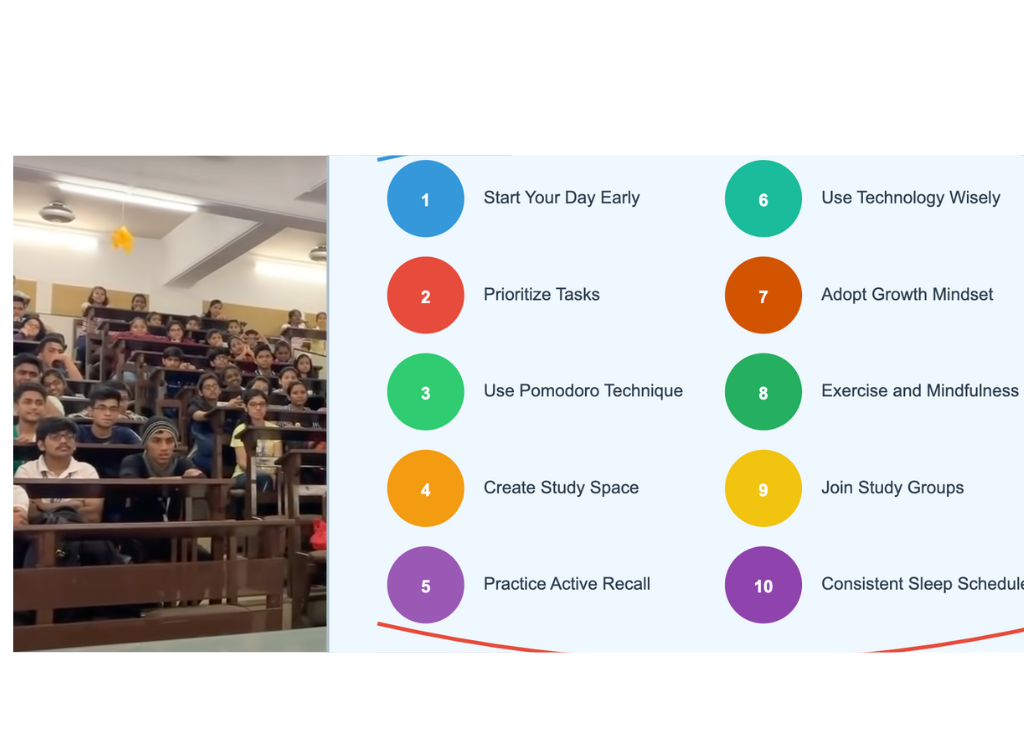In today’s fast-paced academic environment, productivity is key to success. At JustFindExperts, we’ve collaborated with some of the best teachers in the field to bring you ten powerful habits that can transform your approach to studying and boost your productivity. Whether you’re in high school, college, or pursuing advanced studies, these habits will help you make the most of your academic journey and 10 habits to make students more productive.
1. Start Your Day Early
Many successful students swear by the power of early mornings. A renowned education expert, Dr. Emily Chen explains, “The quiet hours of the morning offer a distraction-free environment, perfect for tackling challenging tasks.” Try waking up 30 minutes earlier than usual and use this time for focused study or planning your day.
2. Prioritize Tasks with the Eisenhower Matrix
Time management is crucial for productivity. Professor James Harper, who specializes in student success strategies, recommends using the Eisenhower Matrix. “Divide your tasks into four categories: urgent and important, important but not urgent, urgent but not important, and neither urgent nor important,” he advises. This method helps you focus on what truly matters and avoid time-wasters.
3. Embrace the Pomodoro Technique
Breaking your study sessions into manageable chunks can significantly increase your focus and productivity. The Pomodoro Technique, which involves 25-minute focused work sessions followed by 5-minute breaks, is highly effective. Dr. Sarah Thompson, a cognitive psychologist, notes, “This technique aligns with our brain’s natural attention span and helps prevent burnout.”
4. Create a Dedicated Study Space
Your environment plays a crucial role in your productivity. “A clutter-free, well-organized study space can dramatically improve focus and efficiency,” says interior design expert and educational consultant, Lisa Rodriguez. Designate a specific study area, keep it tidy, and personalize it to create a motivating atmosphere.
5. Practice Active Recall
Instead of passively re-reading your notes, engage in active recall. Dr. Michael Patel, a neuroscience researcher, explains, “Testing yourself on the material, even if it’s challenging, strengthens neural connections and improves long-term retention.” Use flashcards, practice questions, or explain concepts out loud to enhance your learning.
6. Utilize Technology Wisely
In our digital age, technology can be both a blessing and a curse for productivity. Tech education specialist, Emma Watson (not the actress), suggests, “Use apps like Forest or Freedom to block distracting websites during study sessions. Additionally, tools like Notion or Evernote can help organize your notes and projects effectively.”
7. Adopt a Growth Mindset
Your mindset significantly impacts your productivity and academic success. Dr. Carol Dweck’s research on growth mindset has revolutionized education. As she puts it, “Believing that your abilities can be developed through dedication and hard work creates a love of learning and a resilience that is essential for great accomplishment.” Embrace challenges as opportunities to grow rather than threats to your abilities.
8. Practice Regular Exercise and Mindfulness
Physical activity and mental well-being are closely linked to academic performance. Fitness coach and education advocate, Mark Stevens, recommends, “Incorporate at least 30 minutes of exercise into your daily routine. It boosts cognitive function and reduces stress.” Additionally, mindfulness practices like meditation can improve focus and emotional regulation.
9. Join or Form Study Groups
Collaborative learning can significantly enhance productivity. Professor Anna Martinez, an expert in cooperative learning, explains, “Study groups provide opportunities for peer teaching, diverse perspectives, and motivation. They also help in maintaining accountability.” Form a group with classmates who share your academic goals and meet regularly to discuss and review course material.
10. Develop a Consistent Sleep Schedule
Last but certainly not least, never underestimate the power of good sleep. Sleep specialist Dr. Jason Lee emphasizes, “Consistent, quality sleep is crucial for memory consolidation, cognitive function, and overall well-being.” Aim for 7-9 hours of sleep per night and maintain a regular sleep schedule, even on weekends.
Putting It All Together
Incorporating these habits into your daily routine won’t happen overnight, and that’s okay. Start by choosing one or two habits that resonate most with you and gradually integrate them into your life. Remember, the goal is progress, not perfection.
Dr. Rachel Green, an educational psychologist, advises, “Be patient with yourself as you develop these new habits. It typically takes about 66 days for a new behavior to become automatic. Stay consistent, and you’ll see significant improvements in your productivity and academic performance.”
At JustFindExperts, we believe that every student has the potential to excel. By adopting these habits recommended by top teachers and experts in the field, you’re setting yourself up for success not just in your academic life, but in your future career as well.
Remember, productivity is not about doing more; it’s about doing what matters most efficiently and effectively. As you implement these habits, you’ll likely find that you’re not only getting more done but also enjoying your academic journey more.
We’d love to hear about your experiences as you adopt these productive habits. Share your success stories or challenges with us – your insights could inspire other students on their path to productivity and academic excellence. Here’s to your success!





















